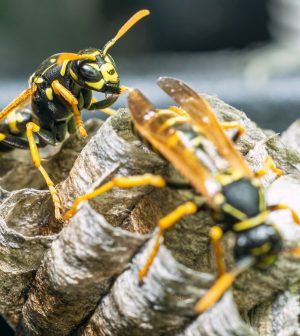- Could Your Grocery Store Meat Be Causing Recurring UTIs?
- Are You Making This Expensive Thermostat Error This Winter?
- Recognizing the Signs of Hypothyroidism
- 10 Strategies to Overcome Insomnia
- Could Artificial Sweeteners Be Aging the Brain Faster?
- Techniques for Soothing Your Nervous System
- Does the Water in Your House Smell Funny? Here’s Why
- Can a Daily Dose of Apple Cider Vinegar Actually Aid Weight Loss?
- 6 Health Beverages That Can Actually Spike Your Blood Sugar
- Treatment Options for Social Anxiety Disorder
Yellowjackets and Bees Swarm in NC in Helene’s Aftermath

Even as folks in North Carolina continue to clean up following the devastation of Hurricane Helene, a new health danger has emerged: The massive flooding that swept away roads and towns also uprooted the underground nests of yellow jackets, bees and other stinging insects.
That has triggered a surge in swarms that attack and sting people, which in turn has prompted the North Carolina Department of Health and Human Services to buy Benadryl and epinephrine injections to help fill requests through hospitals, emergency medical personnel and doctors, the Associated Press reported.
Direct Relief, a humanitarian aid group, said it has already delivered more than 2,000 EpiPens to community health centers, clinics and pharmacies across the mountains of western North Carolina.
“With every disaster, we get requests for EpiPens but this one is definitely an outlier,” said Alycia Clark, Direct Relief’s chief pharmacy officer. Many of the people coming in with stings are electricians working to restore power lines and other outdoor workers, Clark told the AP.
Pharmacists in the state can also provide emergency refills for people who are already prescribed allergy medications, and the state plans to let people to buy epinephrine injections without a prescription, the AP reported.
While most people are not allergic to stings from bees and other insects, some can have a severe allergic reaction that can lead to anaphylaxis that can cause difficulty breathing, swelling of the tongue and throat, weak pulse and loss of consciousness, the Mayo Clinic says.
In these situations, epinephrine should be given immediately. Being stung more than a dozen times can also cause a buildup of venom in the body that can trigger dizziness, fever, convulsions or vomiting.
Wearing long-sleeved, light-colored clothing that has a smooth finish, along with avoiding perfumes and smelly soaps and deodorants, can lower the chances of being stung.
What should folks do tp avoid getting stung?
If there’s only one around, stay calm and still, and don’t swat at it. But if several are stinging, experts say it’s better to quickly get indoors or to a shaded area because bees, especially, release a chemical when they sting that draws other bees.
More information
The Association of State and Territorial Health Officials has more on the health dangers of hurricanes.
SOURCE: Associated Press
Source: HealthDay
Copyright © 2026 HealthDay. All rights reserved.










